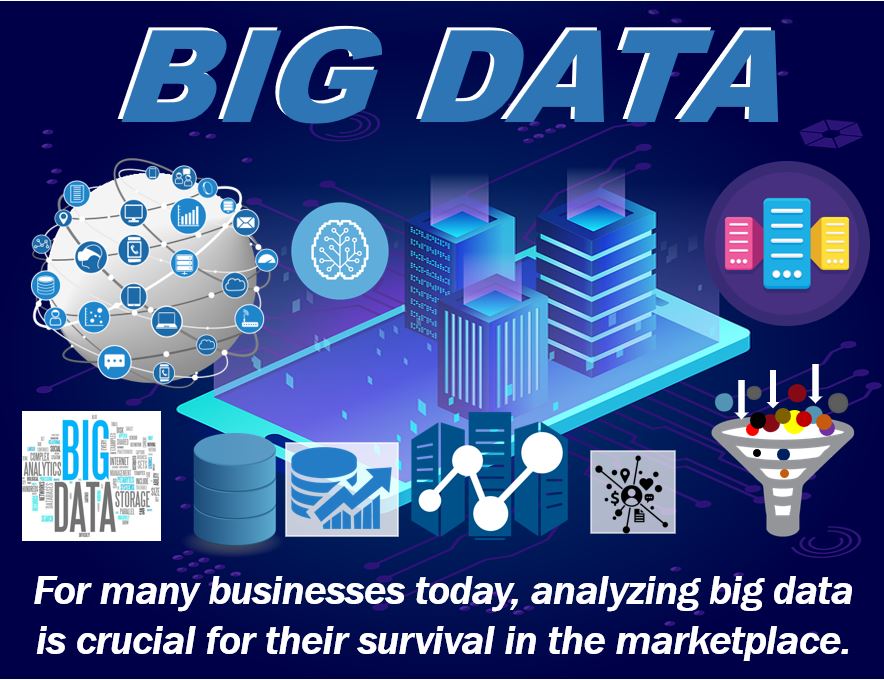What is big data? Definition and examples
Big data refers to digital information or data pools consisting of at least one petabyte. One petabyte is ten plus fifteen zeros, i.e., 10,000,000,000,000,000 or 1015. Data is information such as facts and numbers, which we gather and analyze.
Big data consists of huge, complex data sets, which typically come from new data sources. The sets grow and grow at ever-increasing rates. The amount of data is so massive that traditional software cannot handle it. We can use these oceans of information to overcome business problems – obstacles that we were unable to deal with effectively before.

Wikipedia.org says the following regarding the term:
“Big data is a field that treats ways to analyze, systematically extract information from, or otherwise deal with data sets that are too large or complex to be dealt with by traditional data-processing application software.”
The five Vs
We describe big data as having the 5Vs: Value, Volume, Variety, Velocity, and Veracity. Let’s have a look at them:
Value
Data alone offers no benefit unless you can convert it into something that can help your business thrive. If, thanks to the information, you can more accurately predict likely outcomes, it will be easier for you to make strategic decisions. In this case, therefore, your data has value.
Put simply, if the information cannot boost profits, improve your business’ medium- or long-term prospects, or help you overcome certain obstacles, it is unlikely to have any value. As far as you are concerned, it is worthless.
Acuvate.com offers the following advice for entrepreneurs who are trying to determine whether collecting and analyzing all that information is really worth it:
“One way to ensure that the value of big data is considerable and worth investing time and effort into, is by conducting a cost Vs benefit analysis.”
“By calculating the total cost of processing big data and comparing it with the ROI that the business insights are expected to generate, companies can effectively decide whether or not big data analytics will actually add any value to their business.”
Volume
How much data there is matters a lot. Large volumes of unstructured, low-density data need to be processed. In many cases, such as with, for example, Twitter feeds, we do not know what the value of the information is.
For some businesses, we may be talking about hundreds of petabytes of information, while for others it could just one or two.
Variety
As the word suggests, this is all about how many different kinds of data we receive or have access to.
Oracle.com makes the following comment regarding variety in this context:
“Traditional data types were structured and fit neatly in a relational database. With the rise of big data, data comes in new unstructured data types. Unstructured and semi-structured data types, such as text, audio, and video, require additional preprocessing to derive meaning and support metadata.”
Velocity
This term refers to how fast we receive the data, and maybe also how quickly we act on it. Many Internet-enabled smart products operate in real or quasi-real time. They require real-time evaluation as well as action.
Veracity
Veracity is the quality of being accurate, honest, and true. You may have tons and tons of data, but do you know how reliable it is? Does it come from a reputable source?
Big data and today’s business world

Today’s regional, national, and global marketplaces are very different from what existed a few decades ago. Most businesses now rely of large amounts of genuine, relevant, and up-to-date information to compete effectively against their rivals.
Every day, companies are flooded with massive volumes of both structured and unstructured data. However, what matters the most is not just what information you have collected, but what you do with it, i.e., how you act on what you know.
Chief Executive Officers (CEOs) and members of their board gather and analyze information for insights which typically help them determine what steps to take next. Put simply, these giant pools of information help them in their decision-making process.
Sas.com lists five potential benefits for companies that gather and analyze big data properly:
- Better use and management of time.
- Customization of current products or services, or the development of new ones.
- Reduced costs.
- Better quality offerings.
- More quality information enables people to make smarter decisions.
Big data is changing the way many businesses, organizations, and even government departments go about their activities. The change is due to the way people manage and derive insight from the information.

